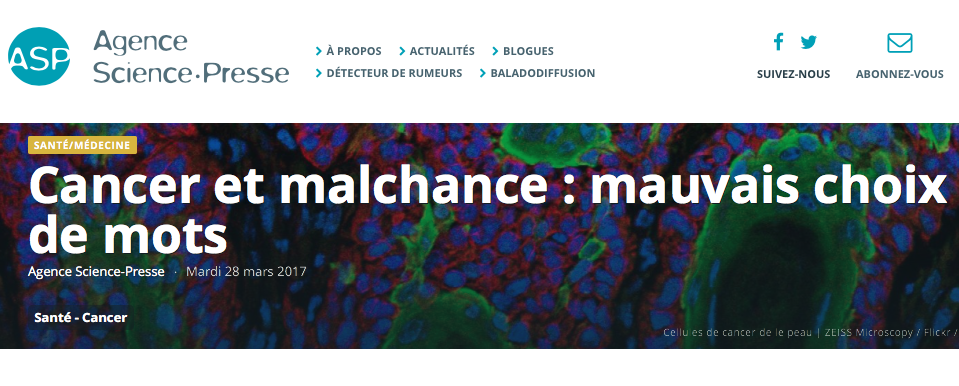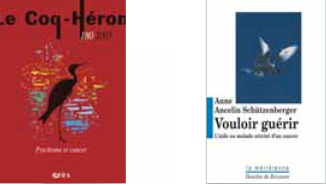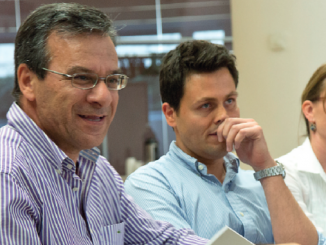Cancer, genetics, “bad luck” and prevention through lifestyle: two years after their first study that tried to quantify the random mutations that accumulate during stem cell divisions in healthy cells and drive cancer in different tissues, cancer geneticist Bert Vogelstein and mathematician Cristian Tomasetti, from the Johns Hopkins University in Baltimore, Maryland, published a new article in Science. The new study extends the analysis to 32 cancer types, and takes into account new cancer data from several countries. And it risks to reignite the controversy on cancer prevention strategies, also because of the oversimplification of the message conveyed by many media.

Cancer is known to be largely a genetic disease, in which some of the mutations are more dangerous than others: according to the authors’ new estimate – based on a complex mathematical model – two thirds (66%) of cancer-promoting mutations arise randomly during cell division in various organs throughout life, while just 29% trace to environmental causes (like smoking and sun exposure), and 5% are inherited.
Many cancers are supposed to arise from stem cells, which are present in several organs: Vogelstein and Tomasetti’s original analysis observed that the more stem cells and the more rapidly they replicate in each organ, the higher the risk of cancer in that tissue. Applying a mathematical model, they concluded that two-thirds of the variability in cancer risk across tissue types might be associated to these stem cells, and what they called “bad luck” mutations that charachterise them.
When the first paper appeared in 2015, its conclusions were contested, and widely distorted in the media, where the oversimplified message was that two-thirds of cancer cases could be attributed to “bad luck”: in fact, most cancers are the result of several subsequent mutations, so there is no clear relationship between the number estimated by the mathematical model and the number of actual cancer cases associated to those mutations.
«Two years ago, Time wrongly reported that “Most cancer is beyond your control.” The Guardian incorrectly wrote: “Two-thirds of adult cancers largely ‘down to bad luck’ rather than genes.” And the BBC misleadingly said: “Most cancer types ‘just bad luck.’” All of these deceptive headlines arose from a widely misinterpreted study that looked at the role of random chance in initiating cancers. That paper was itself criticized for a slew of methodological flaws, and spawned more than a hundred rebuttals» now recollects an in-depth analysis published by The Atlantic («No, We Can’t Say Whether Cancer Is Mostly Bad Luck»).
The new installment published at the end of March in Science extended the original analyis to a mix of common and rare cancers for which both incidence data and information on stem cell numbers and replication rates were available across 69 countries, and found a comparable correlation, suggesting that the two-thirds figure holds up globally. This time, the authors were more explicit in stating that the relationship with cancer cases is complex, and that their calculation is perfectly compatible with estimates that 42% of cancer cases are preventable: «They did it right this time» Dr. Otis Brawley, chief medical officer of the American Cancer Society, said. «In the first paper they upset a lot of people who are advocates for cancer prevention, and confused a lot of people. But a reasonable person can read this one and think, prevention is not useless».
Still, many experts object to the “very reductionist” approach, that led the authors to conclude that everything that has no clear cause can be then ascribed to random, unavoidable replication errors (called «replicative (R) mutations», that arise from unavoidable errors associated with DNA replication) : «The authors make a point that heredity is associated with a certain percentage of cancer, and environment is associated with a certain percent, and this is probably true» Anne McTiernan, a physician and epidemiologist at the Fred Hutchinson Cancer Research Center told The Atlantic. «But then to assume that the rest is because of stem cell divisions and chance… we just don’t know».
Back in 2015, CancerWorld published an interview with Bertram Kramer, head of Cancer Prevention at the US National Cancer Institute («Our cancer risk is not written in the stars») to try and clear up some of the confusion.





